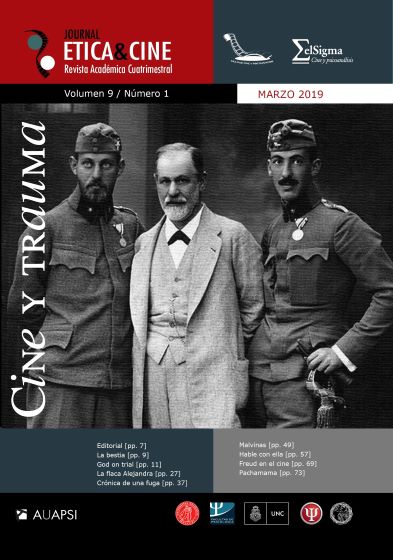La búsqueda ambivalente del Padre Perdido
DOI:
https://doi.org/10.31056/2250.5415.v9.n1.23894Palabras clave:
Padre como "tercero", Esperanza, Pérdida, FantasíaResumen
Este ensayo llena un vacío en nuestra comprensión de Benigno, el protagonista principal en “Hable con Ella” al poner de relieve la ubicación interna de los Hombres” y “Los Padres” en su vida psicológica, tal como se ilustra en la narrativa de la película. También consideramos algunas experiencias personales de Pedro Almodovar con los hombres y Padres, que posiblemente son reflejados en la película. Aquello que expresamos como autor o director siempre tiene aspectos de la persona que somos o de quien quisiéramos ser.Referencias
Almodóvar, A., Michel, R. (productores) y Almodóvar, P. (director). (2002). Hablé con ella [Cinta cinematográfica]. España: El Deseo S.A.
Arroyo, J (2002). Entrevista con Almodóvar. The Guardian, Reino Unido.
Brok, A.J., (1991). The playing alliance in film and on the couch. Paper, Spring meet-ing, Div. 39, American Psychological Association, Chicago.
Brok, A.J. (1998). Attachment and involvement as modes of romantic coupling. Paper, Division 39, Spring Meeting, American Psychological Association, Boston.
Brok, A.J. (2006a). What can we learn from Charlie Chaplin?.Conferencia anual, American Psychological Association, New Orleans.
Brok, A.J. (2006b). The obtainable moment of desire, the elusive construction of love. The Pacific Northwest Psychoanalytic Society, Section I, Division 39 APA, The Northwest Alliance for Psychoanalytic Study, y the Seattle Psychoanalytic Society and Institute, 14 de Octubre, Seattle, Washington.
Brok, A.J. (2008). Discovering vs. Finding in Analytic Work for both analyst and Patient. Annual Spring Meeting, Division 39, American Psychological Association. Nueva York, 4 de abril de 2008.
Chaplin, C. (productor y director). (1935). Tiempos Modernos [Cinta cinematográfica]. Estados Unidos: Charles Chaplin Productions.
Chaplin, C. (productor y director). (1940). El Gran Dictador [Cinta cinematográfica]. Estados Unidos: Charles Chaplin Film Corporation.
Chaplin, C. (productor y director). (1947). El Señor Verdoux [Cinta cinematográfica]. Estados Unidos: Charles Chaplin Film Corporation.
Chaplin, C. (productor y director). (1952). Candilejas [Cinta cinematográfica]. Estados Unidos: United Artists.
Chasseguet- Smirgel, J. (1985). The Ego ideal. Free Association Books.
Freud, S. (1921). Group Psychology and analysis of the Ego SE, 18, 65-144. Londres: Hogarth Press.
Fried, W. (2017). Critical Flicker Fusion: Psychoanalysis at the Movies, 71- 83. Londres: Karnak.
Lichtenstein, D. (2005). Talk to her. International Journal of Psychoanalysis, 3(86), 905 – 914.
Lynn, K. (1997). Charlie Chaplin and his times. Nueva York: Simon and Schuster.
Mackenzie, S. (2002). All About my Father. The Guardian, Reino Unido.
Max, D.T. (2016). The Evolution of Pedro Almodovar. New Yorker.
Robinson, D. (1985). Chaplin, his life and Art. Nueva York: McGraw Hill.
Sabbadini, A. (2007). The Talking Cure: from Freud to Almodovar, Hable con Ella. En A. Sabbadini (Ed.) Projected Shadow (65 -72). Londres: Rutledge.
Target M., y Fonagy, P. (2002). Fathers in Modern Psychoanalysis and Society, The role of the Father in child Development. En J. Trowel, y A. Etchegoyen (Edts.) The importance of fathers: a psychoanalytic re-evaluation. Nueva York: Taylor and Francis.
Villegas-Lopes, M. (2003) Charles Chaplin, El genio del Cine. Argentina: Ediciones Folio, SA.
Descargas
Publicado
Número
Sección
Licencia
Los autores que publiquen en Ética y Cine Journal aceptan las siguientes condiciones:
Los autores/as conservan los derechos de autor © y permiten la publicación a Ética y Cine Journal, bajo licencia CC BY-SA / Reconocimiento - Reconocimiento-CompartirIgual 4.0 Internacional. La adopción de esta licencia permite copiar, redistribuir, comunicar públicamente la obra, reconociendo los créditos de la misma, y construir sobre el material publicado, debiendo otorgar el crédito apropiado a través de un enlace a la licencia e indicando si se realizaron cambios.

Este obra está bajo una licencia de Creative Commons Reconocimiento-CompartirIgual 4.0 Internacional.




